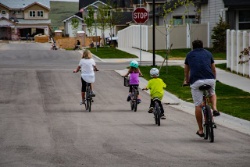We Must Take Concussion More Seriously
24 May 2005
We Must Take Concussion More Seriously - Brain Injury Awareness Week 6 - 12 June
New Zealanders must take concussion more seriously: that is the key message of Brain Injury Awareness Week which takes place this year from 6 - 12 June.
The Brain Injury Association of New Zealand (BIANZ) is concerned that many instances of concussion are going unreported and undiagnosed and consequently people are at risk of long-term brain damage because they are not getting proper treatment.
Although around 7,000 New Zealanders are hospitalised each year after receiving a head injury, the BIANZ estimates the true number to be about 23,000 more and many of these instances are unreported.
Concussion occurs when a sudden, violent movement to the head causes the brain to bounce against the skull. Undiagnosed, it can have serious long-term consequences, especially if a second concussion occurs before the brain has fully healed. When that happens, brain cells that would have recovered will die and permanent brain damage can result.
Many untreated head knocks occur on the sports field, when players often show their toughness by playing on, and in the school playground, frequently escaping the attention of teachers and parents.
"We want New Zealanders to be much more alert to concussion and to learn more about how to recognise and treat it properly," says Harley Pope, Director-Marketing of the Brain Injury Association of New Zealand (BIANZ).
"Unfortunately, because there are often few obvious cuts, bruises and broken limbs, people cannot see the extent of the damage and mistakenly think the victim is in no danger," Mr Pope said. brain injury ….. 2
"Our message to sports coaches, teachers, parents and family members is always to seek expert help to assess the injury whenever concussion is suspected. No matter what the victim may feel, the greatest favour we can do them is to make sure they see a paramedic or doctor before resuming normal activity."
"All too often this is not happening and permanent life-changing damage is the result."
To get the message out, the thirteen regional Brain Injury Associations will be undertaking many special awareness week activities in their local communities and will be distributing ACC-produced "Sideline Concussion Check" packs to sports organisations and concussion awareness posters to schools and sports clubrooms.
Year-round, the regional Brain Injury associations provide an invaluable liaison service for brain injured people and their families, finding appropriate professional help for them, providing advocacy assistance and introducing them to support groups.
To help sustain this work, there will be a street bucket collection on Saturday 11th June in most major centres.
ENDS


 FASD-CAN: People With Fetal Alcohol Spectrum Disorder (FASD) Dismayed At Government’s Response To The Rights Of Disabled People
FASD-CAN: People With Fetal Alcohol Spectrum Disorder (FASD) Dismayed At Government’s Response To The Rights Of Disabled People NZ Opera: Jane Austen Opera Coming To Christchurch & Dunedin - South Island Premiere | NZ Opera’s Mansfield Park Returns This April
NZ Opera: Jane Austen Opera Coming To Christchurch & Dunedin - South Island Premiere | NZ Opera’s Mansfield Park Returns This April Sport Manawatū: Women’s Health Series Empowers Women To Prioritise Their Wellbeing
Sport Manawatū: Women’s Health Series Empowers Women To Prioritise Their Wellbeing Pure Adventure Charitable Trust: Iconic One New Zealand GODZONE To Make Triumphant Return To New Zealand’s Adventure Racing Scene
Pure Adventure Charitable Trust: Iconic One New Zealand GODZONE To Make Triumphant Return To New Zealand’s Adventure Racing Scene The Charter School Agency: New Charter Schools Open Doors To First Students
The Charter School Agency: New Charter Schools Open Doors To First Students  The Wednesday Challenge: Tauranga Travel Initiative Goes National
The Wednesday Challenge: Tauranga Travel Initiative Goes National